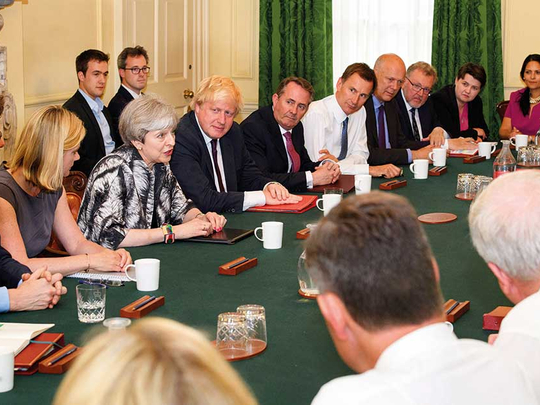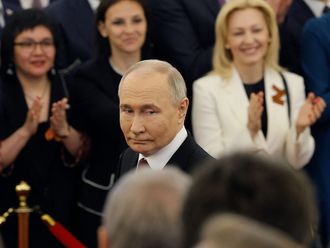
LONDON: Senior members of British Prime Minister Theresa May’s government rallied to her defence Monday amid doubts about whether she will remain in power following a disastrous election result.
As the Conservative Party digested the loss of its majority, government officials suggested both the announcement of the prime minister’s agenda, known as the Queen’s Speech, and talks over Britain’s divorce from the European Union could be postponed.
The possible delays come as critics call for cross-party discussions to reach a consensus on the EU after the election undercut May’s drive for a “hard Brexit” that would take the UK out of the European single market.
May moved to demonstrate that she understands the frustration of voters by moving up a meeting with rank-and-file Conservative Party lawmakers, some of whom have called for her to step aside. The meeting will now be held Monday afternoon instead of Tuesday.
The prime minister’s most prominent rival, Foreign Secretary Boris Johnson, sought to quash any suggestion that she would be immediately ousted. Writing in the mass-circulation Sun newspaper, Johnson stressed that the Conservatives won more votes than at any time since Margaret Thatcher and are still the largest party in Parliament.
“The people of Britain have had a bellyful of promises and politicking,” he wrote. “Now is the time for delivery — and Theresa May is the right person to continue that vital work.”
Courting DUP
With opinion polls showing the Conservatives had a commanding lead over the opposition Labour Party, May called an early election in hopes of increasing her majority in Parliament and strengthening her position in Brexit negotiations.
Instead, the election stripped May of her majority and obliterated her political authority. The Conservatives won 316 seats in the House of Commons, six short of a majority, and are now trying to secure the support of Northern Ireland’s Democratic Unionist Party to assure passage of May’s programme.
Over the weekend, May fired her top two aides to avoid being toppled by Conservative lawmakers who were furious at being shut out of decision-making during the election campaign.
She also restored former Justice Secretary Michael Gove to the Cabinet in another move calculated to show she was willing to listen to critics. Gove, a long-time opponent who was dismissed when May became prime minister last year, will now serve as environment secretary.
Conservative leaders on Monday sought to shift the debate away from May’s wounded leadership and onto complex Brexit talks, which were formally set to begin next week.
David Davis, the cabinet member in charge of Brexit, said talks with the EU may not start on Monday because it would clash with the Queen’s Speech, but they will still begin next week.
“It may not be on the Monday because we also have got the Queen’s Speech that week and I will have to speak in that, and so on,” he told Sky News.
Divorce proceedings
Davis suggested the government would focus on the divorce proceedings before moving on to trade. The divorce issues include the rights of EU citizens in Britain and UK citizens in the EU, how much Britain will have to pay to cover previous spending commitments and the border between Northern Ireland and the Republic of Ireland.
The EU has said that sufficient progress must be made on these issues before trade deals can be discussed, though Britain had argued the talks should take place simultaneously.
Moody’s Investors Service said the inconclusive election outcome would complicate and “probably delay” negotiations with the EU.
“Overall, we believe that the election outcome will hamper Brexit negotiations and increase fiscal risks, and therefore be negative for the UK’s credit profile,” Moody’s said in a statement.
“However, the Conservative Party’s reduced share of the vote may indicate a higher likelihood that a ‘softer’ form of Brexit might now be pursued, involving compromises with the EU that Ms. May would not have countenanced previously, and which would be positive.”
As discussion continued, a leading business organisation said the political uncertainty is leading to a “dramatic drop” in confidence. The Institute of Directors survey said company directors see no clear way to resolve the political situation quickly. They also believe another election would negatively impact the UK economy.
“It is hard to overstate what a dramatic impact the current political uncertainty is having on business leaders, and the consequences could — if not addressed immediately — be disastrous for the UK economy,” said Stephen Martin, the director-general of the IoD. “The needs of business and discussion of the economy were largely absent from the campaign, but this crash in confidence shows how urgently that must change in the new government.”











